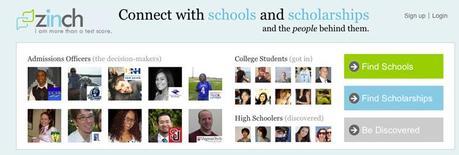
Sites like Zinch.com humanize the application experience through social connection
Applying to colleges is anxiety provoking on multiple levels. If you are a student, it creates self-doubt because so much feels like it’s at stake. It doesn’t matter how many times everyone tells you there are literally hundreds of places you can get a great education and have a great experience, you are very sure that your future success and happiness all rests on your first choice. Applying to college amplifies social comparison as you pit yourself against the application pool where you apply and then are part of the “who got in where” dialogue in your school and community groups.

College applications are stressful for the whole family
Then there’s family dynamics. In some ways, the college application process can be as traumatic for the family as it is for the student. First, there’s the general anxiety level coloring personal interactions. There’s sibling rivalries between those who went before and those who follow, in as many permutations as you can imagine. For many parents, where their kids get into college feels like a reflection of them, the quality of their parenting–not to mention their genes–and that’s on top of their genuine worries about what really is best for their son or daughter. There are a zillion questions: Should it be a big school, a small one, how important is going to a football game or joining a sorority, distance from home, academic offerings, class size, alumni reach for that all important first job, weather, will there be ‘people like me’?-the list goes on and on. Then there’s the daily drip torture of “have you started your applications?” and “what did you decide to write about in your essay?” If you’re totally compulsive (and this goes for parents and kids alike), you’ve built an excel spreadsheet with the admissions stats and other salient features of each school, dutifully labeling them ‘safety,’ ‘good chance,’ and ‘reach.’
Side note: As a mother who did this with five kids with very different interests, stats, and goals, my top three tips are: 1) make sure you have realistically identified schools in each category (safety, good chance, reach) that your kid actually would want to attend, and 2) have compassion and patience. You are the parent. Your job is to provide support and guidance, BUT it’s not about you. Remember that this is period that creates a sense of isolation for your kids because it’s highly competitive. We have many more kids applying to college than there were 20 years ago because of access, population growth, and the increasing importance of education. We have not had the commensurate growth in schools to accept them, and 3) exhale. It is, in fact, true that your kid can have a good experience and get a good education in many places-even ones you might not have heard of.
The website Zinch.com provides a great platform because it’s in a format that is compatible with the way kids (and even their parents) communicate and get information today. Here’s the strengths:
- The design is clean. There are a lot of cognitive and neuropsych reasons why this site works. Rather than haul out things like Gestalt principles of design and neuro responses to language, let it suffice to say, they’ve got it right. The design is visually well organized; the navigational tools are clear and labeled in ways that facilitate movement rather than make you wonder what something means.
- It is personal. From their tag line “I am more than a test score” to the photos and faces of admissions officers, admitted students, and high school applicants on the home page, it rings every bell about making a process that feels lonely and scary, human and supported.
- You don’t have to learn new things to move around their site. They employ well known conventions, such as ‘like’ buttons, search criteria with slider bars, and pop up menus that allow you to make clear choices and direct you easily–even on your first time through the site.
- They talk in the kids’ vernacular. They talk about ‘swagger’ (how well your profile comes up in a search), and ‘mooching’ (where Zinch matches scholarships kids win), and provide ways to connect both on their site and through things like Facebook. The matching scholarships and the social connection are both high motivational factor for returning and using the site.
- It’s low stress because it’s like a practice run with friends–it helps you get the information together without the anxiety of an actual application form because it looks like a Facebook profile. It also lets you see what others are posting. It’s not uncommon for us to overlook something notable that we’ve done because we don’t know it’s a big deal. There are lots of opportunities for “hey, I did that, too! Maybe I should include it on my applications!”
- You can get great information and you can even contact admissions people directly without it being formal or weird.

It would have been helpful to have Zinch.com around for my kids. The social aspect would have encouraged those who were less interested and allowed the more anxious to wade into the process more comfortably. Zinch.com has gotten lots of press, but if you haven’t seen it, check it out. In our globally connected world, this is a powerful model for lots of things, not just applying to college.

